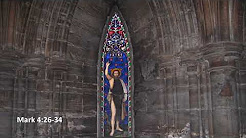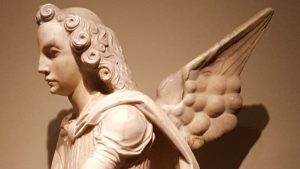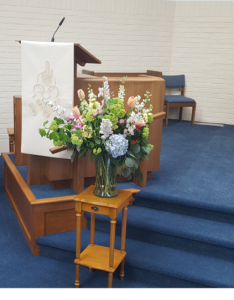This passage from Mark is taken from the revised common lectionary provided by the Vanderbilt Divinity Library. The text is from the NRSV. You can hear a recording of this passage here.
Reading the Gospel aloud invites the audience to experience human encounters with the divine as recounted in the Bible. We can leave interpretation and meaning to members of the clergy and other scholars. What we are most interested in as lay readers is the human experience.

“The kingdom of God is as if …”
In this reading, as in many others, Jesus speaks in parables. Parables seem to step in where technical descriptions fail. It may be impossible to describe the kingdom of God in any way other than a parable. Just as if you could offer a technical description of your back yard in a real estate listing, it would be nearly impossible to convey in the same technical terms the emotions that are awakened by memories of watching your children play in that yard, the sleep outs, the parties and cook outs you have held there for family and friends over the years, the careful landscaping you have done, the sweat and toil you have devoted to mowing, raking and trimming maintenance, the vegetable gardens you have planted, the wildlife you have observed and everything that your back yard has meant to you. You can only really offer, “It’s as if…”
So, the parable is not an objective technical description. It asks the listener to momentarily suspend normal intellectual cognition and disbelief and imagine something quite different, “as if…”
A parable is also dynamic. An “as if…,” is intended to invoke narrative and EXPERIENCE. Like poetry, or a song, a parable captures not simply the factual and intellectual – neuroscience — explanation of an experience, but the emotion, if not physical sensation, of an experience.
I think parables also incorporate narratives because they are easier to remember than definitions and specifications. A parable is much more apt to go viral than a technical description. The listener is engaged and transformed.
And I love the fact that Jesus leaves the “explanations” to his disciples, almost as a side bar. Again, it suggests that experience is more important than explanation.
Text Analysis
There is a sense of wonder in these parables: “The earth produces of itself,” and “He does not know how.”
There is the dynamic of time at work…”sleep and rise day and night.”
The parables invoke mystery. These are extended miracles of micro-creation. The circle of life, of planting and harvesting is a mystery. We do not know how, but the harvest comes.
The tiny mustard seed is magical. Shakespeare names one of the charmed fairy handmaidens from A Midsummer Night’s Dream, Mustardseed.
The dynamics of change and transformation are captured in the parables. In the parable, the tiny hand sown mustard seed becomes the greatest of all shrubs.
The solemnity of service is offered by the mustard seed. Shakespeare’s Mustardseed offers a hand to Bottom. The mustard seed of the parable “ puts forth large branches, so that the birds of the air can make nests in its shade.”
Mystery, transformation, and service are all concepts that can animate your reading.
Reading this passage aloud
This passage should be read as poetry; not as a technical description. The passage is less objective reporting about how Jesus told a parable – and for the record this is the parable he told — and more of an attempt to capture the spirit and presence of the kingdom of God in multiple parables for a listening audience.
These parables are intended to capture the imagination of the audience with the imagery of harvest and bounty. They are meant for all, “As they were able to hear”: not just listen or understand, but HEAR.
There is rhythm in the language. There is care in the planting of images and a growing excitement as seeds are sown, live takes root and yields are realized.
There is revelation and awe.
Each parable should begin in the spirit of, “imagine this!” and then enjoy and exult in the lushness of the imagery.

